句型、倒装、省略1
英语语法复习专题 特殊句式--强调、省略和倒装
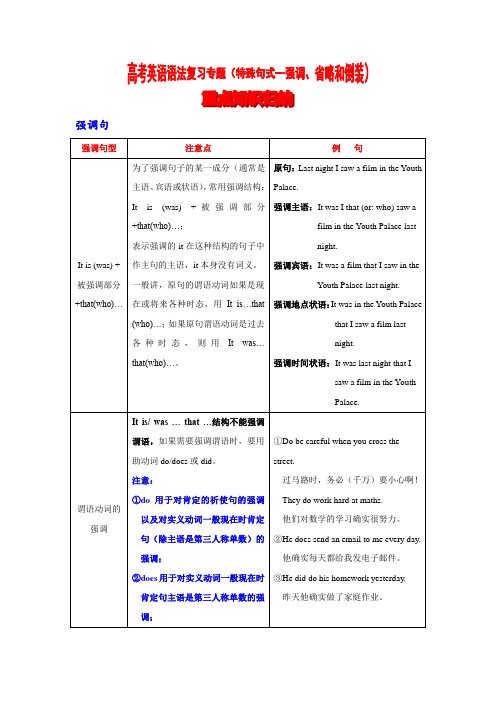
强调句③did用于对实义动词一般过去时肯定句的强调。
It is (was) +被强调部分+that(who)…句型的变式It is (was) + 被强调部分+that(who)…句式基本特征:Is/ Was it +被强调部分+that…;或情态动词+it+ be+被强调部分+ that…①Was it in 1969 ________ the American astronautssucceeded _______ landing on the moon ?A. when; onB. that; onC. when; inD.that; in②Could it be in the restaurant in ______ you haddinner with me yesterday ______ you lost yourhandbag?A. that; whichB. which; thatC. where; thatD. that; where特殊疑问句形式句式基本特征:特殊疑问词+is/was it that…?或特殊疑问词+情态动词+it+be++被强调部分+that…—_______is it _______has made Peter _______heis today?—Determination.A. What; that; thatB. That; that; whatC. What; what; thatD. What; that; what反意疑问句形式句式基本特征:It is/was+被强调部分+that…,isn’t/ wasn’t it?It was Alice and her boyfriend who sent the old manto the hospital, ______?A. do theyB. didn’t theyC. wasn’t itD.was it强调句与其它句型的结合与名词从句的结合句式特征为:整个强调句型用作名词性从句或者在强调句型中含有名词性从句。
英语语法中的倒装句和省略句结构
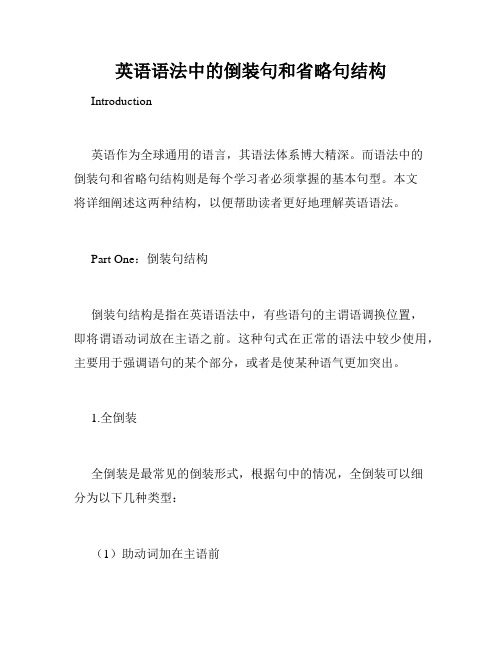
英语语法中的倒装句和省略句结构Introduction英语作为全球通用的语言,其语法体系博大精深。
而语法中的倒装句和省略句结构则是每个学习者必须掌握的基本句型。
本文将详细阐述这两种结构,以便帮助读者更好地理解英语语法。
Part One:倒装句结构倒装句结构是指在英语语法中,有些语句的主谓语调换位置,即将谓语动词放在主语之前。
这种句式在正常的语法中较少使用,主要用于强调语句的某个部分,或者是使某种语气更加突出。
1.全倒装全倒装是最常见的倒装形式,根据句中的情况,全倒装可以细分为以下几种类型:(1)助动词加在主语前例如:Are you sure about that?(你对此确信吗?)(2)谓语动词前有否定词例如:Never have I been so happy in my life.(我一生中从未如此开心。
)(3)表示地点、时间或者原因的短语放在句首时例如:In the middle of the room stood a table.(屋子中央放着一张桌子。
)(4)以only开头的句子例如:Only when he arrived did I realize how much I missed him.(他到了才让我意识到我有多想念他。
)2.部分倒装在一些情况下,只有句中的某些成分需要进行倒装,这种形式就叫部分倒装。
部分倒装的几种常见形式如下:(1)否定短语位于句首例如:Not only does he speak English, but he also speaks fluent French.(他不仅能说英语,而且还能说流利的法语。
)(2)so、such和as引导的状语位于句首例如:Such was the beauty of the garden that I couldn't help but take a picture.(花园的美丽如此迷人,我不得不拍下照片。
)Part Two:省略句结构省略句结构是指在英语语法中,有些句子的主语、谓语或者其他成分可以省略,使句子更简单明了。
特殊句式强调省略主谓一致倒装及其他高考英语 语法
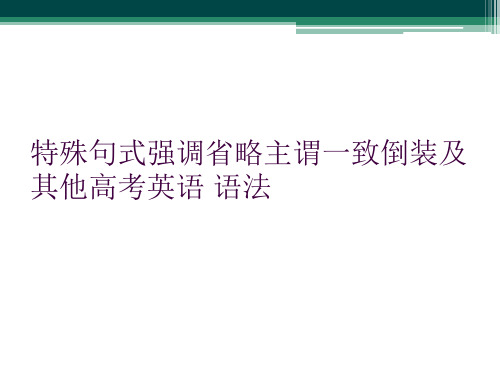
特殊句式强调省略主谓一致倒装及 其他高考英语 语法
特殊句式(强调、省略、主谓一致、 倒装及其他)
1.强调句的基本句型是“It is/was+被强调的部分+that/who+ 其他部分”。被强调的部分可以是主语、宾语和状语等。
It is only children who make such stupid mistakes. 只有孩子才会犯这样愚蠢的错误。 (2009·浙江卷)—I’ve read another book this week. ——这星期我又看了一本书。 —Well,maybe it is not how much you read but what you read that counts. ——嗯,也许重要的不是你看了多少而是你看了什么。 It was because her mother was ill that she didn’t come to school yesterday.是因为她妈妈病了,她昨天才没来上学的。
Sunday.
A.which
B.that
C.where
D.there
解析: 该题考查句式。该题实际考查的是定语从句,修饰先行词
supermarket。很多考生可能会误认为是强调句。
高考倒装省略强调等用法
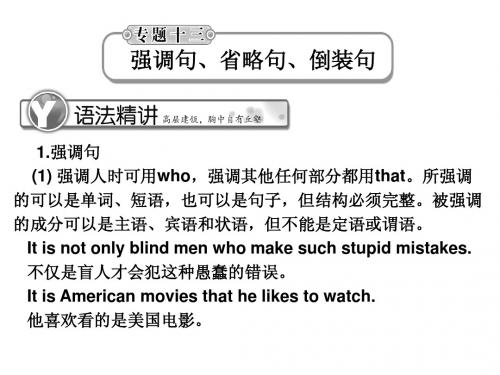
(4) 在so/such ...that引导的结果状语从句中,so或such引导的部 分置于句首时主句用倒装。 So shallow is the lake that no fish can live in it. 湖水那么浅,以致于没有鱼能在里面生存。 Such a good boy is he that we all love him. 他是那么好的一个孩子,我们都喜欢他。 另外,“so/neither/nor+be/助动词/情态动词+主语”so与前面 的肯定句呼应,neither/nor与前面的否定句呼应。其中动词的形式 取决于前一句的动词。表示前者的情况也(不)适用于后者或一者 (不)具备两种情况。 After that we never saw her again,nor did we hear from her. 从那以后我们再也没见过她,也没有收到过她的信件。 I saw the film last week.So did she. 上周我看了这部电影,她也看了。 (5) 省略if的虚拟条件句以had/were/should开头引起的倒装。 Were she my friend, I would ask her for help. 如果她是我的朋友,我就会请她帮忙。
3.倒装句 (1) 表示否定意义或半否定意义的词置于句首时,常用部分倒装。 常见的词有:seldom, never, hardly, no, not, little等。 Little did he know that the police were around. 他一点儿也不知道警察就在旁边。 Never before has our country been as united as it is. 现在我们的国家空前团结。 (2) 由only,not until引导的状语置于句首时,常用部分倒装。 Only by working hard can we succeed. 只有努力工作,我们才能取得成功。 (3) no sooner ...than, hardly ...when等结构中,no sooner 和hardly置于句首时,主句用倒装形式。 No sooner had he arrived home, he began to prepare the supper.他一到家就开始准备晚饭。 Hardly had he entered the room, it began to rain. 他一进屋就开始下雨了。
核心句法(五)特殊句式——强调、倒装、省略
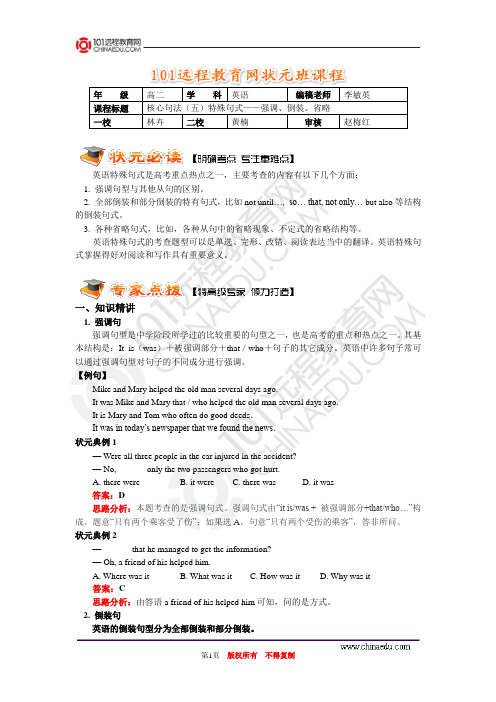
年级高二学科英语编稿老师李敏英课程标题核心句法(五)特殊句式——强调、倒装、省略一校林卉二校黄楠审核赵梅红英语特殊句式是高考重点热点之一,主要考查的内容有以下几个方面:1. 强调句型与其他从句的区别。
2. 全部倒装和部分倒装的特有句式,比如not until…, so… that, not only… but also等结构的倒装句式。
3. 各种省略句式,比如,各种从句中的省略现象、不定式的省略结构等。
英语特殊句式的考查题型可以是单选、完形、改错、阅读表达当中的翻译。
英语特殊句式掌握得好对阅读和写作具有重要意义。
一、知识精讲1. 强调句强调句型是中学阶段所学过的比较重要的句型之一,也是高考的重点和热点之一。
其基本结构是:It is(was)+被强调部分+that/who+句子的其它成分。
英语中许多句子常可以通过强调句型对句子的不同成分进行强调。
【例句】Mike and Mary helped the old man several days ago.It was Mike and Mary that / who helped the old man several days ago.It is Mary and Tom who often do good deeds.It was in today’s newspaper that we found the news.状元典例1— Were all three people in the car injured in the accident?— No, ______ only the two passengers who got hurt.A. there wereB. it wereC. there wasD. it was答案:D思路分析:本题考查的是强调句式。
强调句式由“it is/was + 被强调部分+that/who…”构成。
题意“只有两个乘客受了伤”;如果选A,句意“只有两个受伤的乘客”,答非所问。
强调句型、倒装、省略、替代、it用法热点、考点

强调句、倒装、省略、替代、it用法热点、考点强调句型、倒装、省略、替代、it的语法【要点点拨】1 强调句型高考命题导向:“It is/was…who/that…”强调句型是重要的句型之一,是高考考查的重点之一。
此句型可强调主语、宾语、状语。
如果强调谓语时,用do/does/did+动词原形。
高考通常考查强调句与几个易混句型连词的使用和强调句的问句。
(强调句型注意事项见下表)【要点点拨】2 倒装英语最基本的语序是主语在前,谓语动词在后。
但有时为了强调或平衡句子结构,英语中常用倒装。
倒装句通常有两种基本形式:完全倒装和部分倒装。
将谓语动词完全移到主语之前称为完全倒装;只将助动词,be动词或情态动词放到主语之前称为部分倒装。
一.部分倒装助动词或情态动词提至主语之前,谓语动词位置不变,即为部分倒装,如:Neither could he see through your plan.So little did I know about him that I was easily taken in by his words.Doesn't her invitation appeal to you1. 否定副词位于句首时的倒装在正式文体中,never, seldom, rarely, little, hardly, scarcely, no sooner, no longer, nowhere 等含有否定意义的副词若位于句首,则其后要用部分倒装:I shall never forgive him._______________________我永远不会宽恕他。
He seldom goes out for dinner._______________________ ____他很少出去吃饭。
She hardly has time to listen to music.__________________________________. 她几乎没时间听音乐。
英语倒装、强调和省略语法点
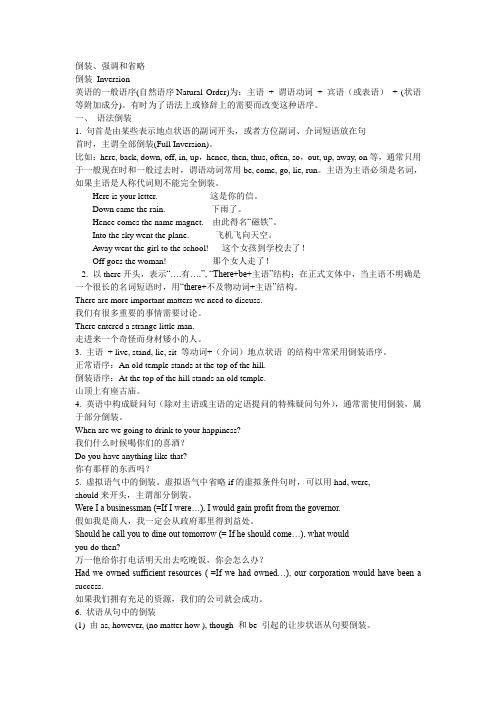
倒装、强调和省略倒装Inversion英语的一般语序(自然语序Natural Order)为:主语+ 谓语动词+ 宾语(或表语)+ (状语等附加成分)。
有时为了语法上或修辞上的需要而改变这种语序。
一、语法倒装1. 句首是由某些表示地点状语的副词开头,或者方位副词、介词短语放在句首时,主谓全部倒装(Full Inversion)。
比如:here, back, down, off, in, up,hence, then, thus, often, so,out, up, away, on等,通常只用于一般现在时和一般过去时,谓语动词常用be, come, go, lie, run。
主语为主语必须是名词,如果主语是人称代词则不能完全倒装。
Here is your letter. 这是你的信。
Down came the rain. 下雨了。
Hence comes the name magnet. 由此得名“磁铁”。
Into the sky went the plane. 飞机飞向天空。
Away went the girl to the school! 这个女孩到学校去了!Off goes the woman! 那个女人走了!2. 以there开头,表示“….有….”, “There+be+主语”结构;在正式文体中,当主语不明确是一个很长的名词短语时,用“there+不及物动词+主语”结构。
There are more important matters we need to discuss.我们有很多重要的事情需要讨论。
There entered a strange little man.走进来一个奇怪而身材矮小的人。
3. 主语+ live, stand, lie, sit 等动词+(介词)地点状语的结构中常采用倒装语序。
正常语序:An old temple stands at the top of the hill.倒装语序:At the top of the hill stands an old temple.山顶上有座古庙。
省略句与倒装句型

省略句与倒装句型省略句,顾名思义,是指在表达中省略了一些词语或成分,以提高语言流畅度和简洁性。
而倒装句型则是指破坏了正常语序,将谓语动词或助动词放在主语之前的句型。
接下来,我们将分别介绍省略句和倒装句型,并为您提供一些实例。
省略句1. 主语省略在日常对话中,我们经常会省略主语,因为主语已经被上下文所指明。
例如:- A: 你吃了吗?- B: 吃了。
2. 谓语动词省略当主语和谓语动词的形式相同或者上下文中已经提到过谓语动词时,可以将谓语动词省略。
例如:- 他懂法语,我也懂。
3. 宾语省略当宾语在上下文中已经明确,或者是一个普遍性的概念时,可以将宾语省略。
例如:- A: 你想喝东西吗?- B: 想。
(省略了"喝东西")4. 介词短语省略在定语从句或者表语从句中,如果动词和介词形成一个固定的词组,可以省略介词短语。
例如:- 这是我昨天买的书。
(省略了"在书店")倒装句型1. 全部倒装在句子的全部倒装中,谓语动词或助动词位于主语之前。
例如:- Out rushed the cat.(猫冲了出来)2. 部分倒装a. 当表示地点或时间的介词短语放在句首时,需要部分倒装。
例如:- In front of the house stood a tall tree.(房子前有一棵高大的树。
)b. 在以"here"、"there" 或 "away" 开始的句子中,也需要进行部分倒装。
例如:- Here comes the bus.(车来了。
)c. 当表示否定的副词或短语位于句首时,部分倒装的结构也要使用。
例如:- Never have I seen such a beautiful sunset.(我从未见过如此美丽的日落。
)总结:通过省略句和倒装句型的运用,我们可以使句子更加简练,增强语言的表达能力和吸引力。
然而,我们在使用这些句型时,也要注意上下文的逻辑连贯性和语言的准确性。
- 1、下载文档前请自行甄别文档内容的完整性,平台不提供额外的编辑、内容补充、找答案等附加服务。
- 2、"仅部分预览"的文档,不可在线预览部分如存在完整性等问题,可反馈申请退款(可完整预览的文档不适用该条件!)。
- 3、如文档侵犯您的权益,请联系客服反馈,我们会尽快为您处理(人工客服工作时间:9:00-18:30)。
1. ________ is no doubt ________ NBA can win the first prize in the match.A. It; whetherB. There; thatC. It; thatD. There; whether2. It is such a good place ________ everyone wants to go and visit ________ it is well-known all over the world.A. that; thatB. as; asC. as; thatD. that; as3. —What is Nancy?—Was it ________ you were referring to.A. hers; whoB. she; thatC. her; thatD. she; who4. —The newly-built store has such high prices.—I agree. Never again _______ here.A. will I shopB. I will shopC. I do shopD. I do shopping5. It is three years ________ the war broke out.A. asB. whenC. sinceD. until6. —Alice, why didn’t you come yesterday?—I ________. But I had an unexpected visitor.A. hadB. wouldC. was going toD. did7. —Write to me when you get home.— _________.A. I mustB. I shouldC. I willD. I can8. The research is so carefully designed that once ________ nothing can be done to change it.A. beginsB. having begunC. beginningD. begun9. Is this the reason ________ at the meeting for his carelessness in his work?A. he explainedB. what he explainedC. how he explainedD. why he explained10. —Your coffee smells great!—It’s from Mexico. Would you like _________?A. itB. someC. thisD. little11. _________, he doesn’t know how to manage people well.A. As smart Jack isB. Smart is as JackC. Jack is so smartD. Smart as Jack is12. The man we followed suddenly stopped and as if _________ whether he wasgoing in the right direction.A. seeingB. having seenC. to have seenD. to see13. —How long has this bookshop been in business?—, _________ 1982.A. AfterB. InC. FromD. Since14. The boy wanted to ride his bike in the street, but his mother told him _________.A. not toB. not to doC. not do itD. do not to15. —What do you think made Mary so upset?—, _________ her new bicycle.A. As she lostB. LostC. LosingD. Because of losing16. I finally got the job I dreamed about. Never in my life ________ so happy.A. did I feelB. I feltC. I had feltD. had I felt17. _________, she still didn’t understand.A. However carefully did he explainB. However he explained carefullyC. However explained carefully did heD. However carefully he explained18. _________ can you expect to get a pay rise.A. With hard workB. Although B. Although work hardC. Only with hard workD. Now that he works hard19. So difficult __________ it to live in an English-speaking country that Idetermined to learn English well.A. I have feltB. have I feltC. I did feelD. did I feel20. Not only _________ interested in football but _________ beginning to show aninterest in it.A. the teacher himself is; all his students areB. the teacher himself is; all are his studentsC. is the teacher himself; are all his studentsD. is the teacher himself; all his students are21. _________ spoken ________ she regretted it.A. Hardly have she; whenB. Hardly had she; whenC. Hardly had she; thanD. Hardly have she; than22. Only in this way _________ to make improvement in the operating room.A. you can hopeB. you did hopeC. can you hopeD. did you hope23. —You forget your purse when you left.—Good heavens, _________.A. so did IB. so I didC. I did soD. I so did24. Not until _________ I came to realize she wasn’t English.A. did she speakB. she spokeC. didn’t she speakD. she speaks25. We’ll have to finish the job, ________.A. long it takes howeverB. it takes however longC. long however it takesD. however long it takes26. _________ be sent to work there.A. Who do you suggestB. Who do you suggest that shouldC. Do you suggest who shouldD. Whom do you suggest should27. _________, he does get angry with her sometimes.A. As he likes her muchB. Though much he likes herC. Much as he likes herD. Much ever if he likes her28. _________ sat down for a rest _________ the door bell rang.A. Hardly I had; whenB. Hardly I had; thanC. Hardly had I; thanD. Hardly had I; when29. So fast _________ that’s difficult for us to imagine its speed.A. does light travelB. do light travelC. travels lightD. light travel30. ________ come into the bank _________ the police arrived.A. No sooner had the thieves; thanB. Soon the thieves; whenC. Soon after the thieves had; butD. No sooner did the thieves; than。
